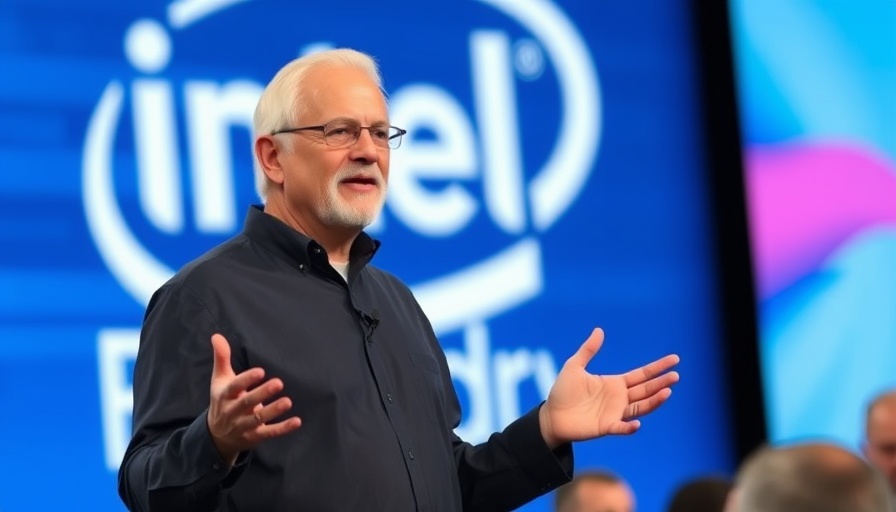
Rethinking U.S. Industrial Policy: The Intel Deal's Wider Implications
In recent months, investors have voiced substantial concern over former President Donald Trump's intent to facilitate a major investment deal with Intel, a move some fear could signal the dawn of a new era of U.S. industrial policy. Observers note that this shift may have far-reaching consequences for stock market trends, investment strategies, and the economic landscape at large. As we delve deeper into the topic, it's vital to assess how this industrial pivot might reshape the investment terrain.
Historical Context and Background
The Intel deal invites historical reflection on U.S. industrial policy, which has ebbed and flowed over the decades. From the post-war revitalization efforts to protect and promote American industries through legislation, to the deregulation waves of the late 20th century, industrial policy has often been influenced by political tides. With Trump's proposal looming, this is reminiscent of the government interventions of the past aimed at fostering greater self-reliance in critical sectors such as technology.
The Value of Infrastructure Investments
Investors must consider the potential advantages and disadvantages of increased government involvement in selecting which sectors to champion. Infrastructure investments, especially in technology and manufacturing, can drive innovation and create jobs. This aligns with a broader trend toward sustainable investing, with companies like Intel promising climate-friendly innovations. With consumer preferences increasingly leaning towards sustainability, interest in mutual funds that focus on environmentally friendly companies is likely to rise.
Parallel Examples to Illuminate the Issue
Countries like China and Germany have successfully integrated strategic industrial policy into their economic growth models. China's focus on becoming a leader in technology through government-backed initiatives has propelled its economy. Similarly, Germany's emphasis on high-tech industries has created a robust manufacturing base. These cases can serve as lessons for the U.S., but they also raise questions about the appropriateness and efficacy of such policies in a market-driven economy.
Investment Implications: Adapting Strategies for Change
With the backdrop of potential U.S. industrial policy shifts, investors might need to reassess their investment strategies. Growth stocks, particularly in technology, stand to benefit, but so might dividend stocks that provide stability amid volatility. Given the uncertain climate, portfolio diversification will be critical—balancing risk while seizing opportunities in sectors receiving governmental support. ETFs and index funds that focus on the tech sector could represent a wise choice. As the market fluctuates, a well-thought-out asset allocation strategy can help manage risk effectively.
Market Timing and Risk Management
The potential fallout from Trump's Intel deal could introduce periods of volatility, motivating investors to consider market timing in their strategies. While a long-term buy-and-hold approach is often touted as the ideal investing philosophy, short-term market corrections might present unique buying opportunities. Employing risk management strategies—such as dollar-cost averaging—can mitigate emotional decision-making during turbulent times.
Future Predictions: Waves of Change Ahead
As the U.S. navigates this possible new era of industrial policy, investors must remain vigilant. Future economic indicators, including inflation and interest rate trends, will significantly influence market dynamics. Understanding these factors is crucial for making informed decisions, whether investing in real estate, alternative investments, or emerging markets. Ultimately, those who stay informed and adaptable will be best positioned to weather potential stormy markets.
The Crucial Role of Investment Education
In this rapidly evolving investing environment, education becomes paramount. Investors should seek resources, including investment apps and online brokerage accounts, to improve their understanding of market trends and strategies. Knowledge about ethical investing practices and impact investing can align financial goals with personal values, meeting the demand for socially responsible investment options.
Conclusion: Be Proactive About Your Investments
As the implications of Trump's Intel deal unfold, it's crucial for investors to actively monitor the landscape, reassess strategies, and be prepared for change. Engaging in informed discussions about portfolio diversification and remaining aware of market fluctuations will empower you to thrive, no matter how the U.S. industrial policy evolves.
 Add Row
Add Row  Add
Add 



Write A Comment